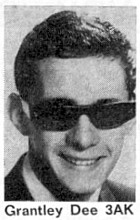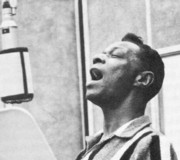
Double-sided hit in Melbo urne with
urne with
Let The Little Girl Dance.
Grantley Dee (1946-2005) was a popular Melbourne disc jockey and singer who worked on radio at 3AK Melbourne and later at 7EX Launceston. He had six charting singles in Melbourne in the late 60s. See also Wild One (1966).
Further reading: See the Rockabilly Hall of Fame’s Grantley Dee page (archived) for a comprehensive biography and photographs.
Image: Australian Radio Almanac, 1968.
Answer Me has a complicated history. Apart from translations or rewrites in a number of languages, the most significant versions are:
1. Mütterlein, the original German-language song (1952), first recorded as Mutterlied;
2. Answer Me, Lord Above, first English version, lyrics by Carl Sigman (1953);
3. Answer Me, My Love (aka Answer Me), with Sigman’s lyrics slightly altered, the most familiar version, as in Nat ‘King’ Cole’s 1954 US hit;
4. Glaube Mir, the German hit version (1954), with new lyrics by the original lyricist.
Now read on…
Single on Co-ed October 1960 by popular New York doo-wop group formed in 1953.
Seventy years later, in 2013, The Harptones were still listing gigs at their website, apparently with some continuity of membership, but the group’s run seems to have come to an end somewhere in the mid-2010s.
This is a novel rewrite and rearrangement of the song, featuring a desperate falsetto refrain: I tried to call you on the phone, you didn’t answer… Come on and answer me… Come on, come-a-come-a-come-a baby…
Further reading: 1. Harptones biography from their now defunct website (archived here) 2. Marv Goldberg’s history and discography of The Harptones. 3. The Wikipedia article on The Harptones tracks personnel changes 1953-2014.
Single on RCA March 1960 by Texas-born singer (1939-2005) best known for Tell Laura I Love Her (1960, #7 USA) and Corinna, Corinna (1960, #9 USA). Ray Peterson set up his own label, Dunes, after the success of Tell Laura I Love Her.
Further reading: Ray Peterson biography at All Music Guide
Single on Polydor 1954
Rudi Schuricke had previously recorded Mütterlein in 1952 with its original lyrics but under the title Mutterlied (the original version, see below).
B-side on Electrola May 1954.
Glaube Mir = believe me, and (Answer Me) in the title is a reference to the English hit version.
After the success of Gerhard Winkler’s Mütterlein/Mutterlied in the USA as Answer Me, My Love the original lyricist Fred Rauch wrote new German lyrics for the song.
As Glaube Mir (Answer Me), recorded by Wolfgang Sauer, it finally became a hit in Germany, the country of its composition.
Meisje Klein = little girl
Single on Philips P 17252 H recorded 17 December 1953, released 1 February 1954 (see Dutch discography here). The Noiret in the writer credits is almost certainly the Dutch singer, pianist, lyricist and composer Louis Noiret (1896-1968).
♫ Listen at Internet Archive
Annie de Reuver (1917-2016) was a popular Dutch singer who debuted in 1934 and lived to the age of 98, sometimes performing well into old age. Heleentje van Cappelle, 9 years old on this record, had a short but prominent career as a child singer but retired from show business soon after, in 1955.
For other versions of Mütterlein/Answer Me in various languages see the Adaptations list at Second Hand Songs.
Sources, further reading: 1. Annie de Reuver and Heleentje van Cappelle articles at nl.wikipedia.org 2. Louis Noiret at Discogs.com and Dutch site Theater Encyclopedie. 3. Audio and discographic details at Internet Archive. 4. Philips (Netherlands) discography.
 Single on Capitol, released at the end of December 1953, charted in February 1954.
Single on Capitol, released at the end of December 1953, charted in February 1954.
Although the song had already been a hit in the UK for David Whitfield and Frankie Laine, this is the version that broke the song in the US and encouraged Fred Rauch to write fresh German lyrics (see above).
10-inch 78 rpm disc on Decca October 1953.
This appears to have been the first version to use Carl Sigman’s amended lyrics, Answer me, oh my love instead of Answer me, Lord above.
Michael Sigman, Carl’s son, notes: Carl hated having to rewrite the lyrics, and always considered the original a far superior lyric. (Email)
Theo Morgan, in a 2005 Usenet post, writes that the BBC would not air David Whitfield’s first recording of Answer Me because of its religious connotations, so he recorded it again with the secularised lyrics.
In the same thread, Scarlotti posts both versions of the lyrics and confirms that Frankie Laine later recorded the Answer me, oh my love version as well, initially for the South African market.
The Guinness Book of 500 Number One Hits (Rice et al, 1982) notes that David Whitfield’s version charted two weeks before Frankie Laine’s original, only to be displaced a week later by Laine. Four weeks later, the two versions were sharing the #1 spot. All historic stuff for chart data enthusiasts, apparently. Also mentioned at UK Charts Facts and Feats.
Single on Columbia (USA), September 1953. Single on Philips (UK) charted in UK October 1953.
With the Norman Luboff Choir.
This version uses Carl Sigman’s original English lyrics to Mütterlein/Mutterlied. In later versions the phrase Lord above became Oh my love (see above).
The Carl Sigman site Majorsongs lists over 60 artists who have recorded Answer Me. They include: Barbara Dickson (1976, #9 UK), Johnny Rivers (1960, Cub single), Gene Pitney (1964, Blue Gene), P. J. Proby (1965, P. J. Proby EP), Ray Stevens (1967, Monument single), Petula Clark (1968, The Other Man’s Grass Is Always Greener), Bryan Ferry (1993, Taxi), Joni Mitchell (2000, Both Sides Now) Perry Como, Bing Crosby, Renee Fleming, Helen Forrest, Robert Goulet, Engelbert Humperdinck, Bert Kaempfert, Mantovani, Matt Monro, Hugo Montenegro, Marty Robbins, George Shearing, Jerry Vale and Mark Wynter.
In Denmark, Keld & The Donkeys charted #16 with their version of Answer Me (1967). [Thanks to Erik Alm.]
The Beatles’ song Yesterday has reminded some listeners of Answer Me. As Carl Sigman’s son Michael puts it: I always felt there was a connection between Yesterday and Answer Me – nothing inappropriate, of course, but a similar cadence and spirit. (Billboard article reprinted at MajorSongs)
10-inch 78 rpm disc on Musica October 1952: see entry at database of Swedish 78s (at SLBA).
This uses the composer’s original title Mutterlein (usually Mütterlein or Muetterlein).
En Visa Till Mor = a song to Mother (cf the title of Rudi Schuricke’s version Mutterlied, mother’s song).
Source: Second Hand Songs’ dating of releases.
Mutterlied = mother’s song
Mütterlein = little mother
Mütterlein appears to be the original and more common title of the composition.
It is sometimes spelt as Muetterlein, where ue replaces ü for typographical reasons.
10-inch 78 rpm disc on Polydor February 1952.
Popular German singer and actor (1913-1973), born in Brandenburg. Rudi Schuricke also recorded the song as Glaube Mir (1954, see above).
Composer Gerhard Winkler wrote the song in honour of his mother’s 75th birthday.
Lyrics by Fred Rauch, who later wrote fresh lyrics for the song as Glaube Mir.
Further reading: Stephan Pflicht’s website on Gerhard Winkler (spotted by Joop Jansen)
Source: Second Hand Songs’ dating of releases,
Single on Monument by individualist singer-songwriter who, in spite of his versality, is probably best remembered for his MAD magazine-style humour on Ahab The Arab and other comic hits of the early 60s. See also Funny Man, one of his serious songs, covered in Australia by Ross D. Wyllie.
Further reading: See the Ray Stevens album and singles discographies, as well as biographical notes and cover shots, at Petr Vitous’s excellent Country LP Discography website.